Das Recht auf urbanes Wohnen – wohnungspolitische und wirtschaftsethische Herausforderungen
DOI:
https://doi.org/10.17879/jcsw-2021-3544Abstract
The right to housing is explicitly or implicitly enshrined in most of the world’s constitutions, including that of Germany. The realization of the right to housing presupposes affordable housing and access to the housing market for all income groups. In order to ensure the social security of housing, the German state uses a variety of methods, acting as an independent actor in the housing market to varying degrees, choosing divergent forms of object-and subject-related instruments, and combining these instruments with regulatory interventions. The article discusses which housing policy measures can be used to implement the right to housing effectively, efficiently, and in compliance with ethical principles. It is shown that the partial rights to “affordable” and “urban” housing that can be derived from the right to housing do not (or cannot) apply without restrictions. Economic and ethical limits are discussed, such as subsidiarity, self-responsibility, cost-benefit trade-offs, market and state failure. Because of high economic and social costs and pervasive injustice, a complete cushioning of social risks and regional developments is not expedient. The social and economic ethical dilemmas that arise in the political definition of these limits are discussed along three central questions.

